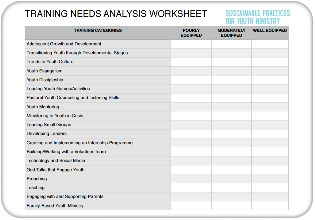- We believe that learning the skills of youth work is an ongoing process and that it’s important to continually invest in professional development.
- We promise to set aside time and money to provide training and development for our youth leader.
Does a key volunteer youth leader really need training?
When Paul writes to Timothy in the New Testament, he clearly places on him a responsibility to train himself, especially in ‘godliness’. But Paul’s advice and guidance in 1 Timothy isn’t just about character and spiritual life; it’s also about skills. Paul offers advice about ways to manage members of the congregation, about pastoral warning signs to monitor and about intergenerational conflicts.
Paul believes that Timothy needs to continue to grow not only in faith, but in understanding, skills and experience. He is aware that Timothy is going to face challenges in his ministry, and so he wants to make sure he’s equipped for the task ahead.
The same challenge exists for churches today to train their youth leader. Alongside their spiritual growth, churches need to think about ongoing training and development for their leader. No matter what skills the youth leader already has, the church has a responsibility to continue to invest in them and develop their skills.
After all, a youth leader needs a large toolbox of skills. They may need development in areas like speaking in public, leading small group programmes or mentoring, developing a strategic plan for their ministry, and dealing with child safety issues. They may face tough situations and often need to know how to pastorally counsel young people with complex needs. They also need to know when and how to refer young people to a professional counselor. All of this requires ongoing training.
Add to that the challenges of a fast-changing culture. Youth leaders need to be able to understand the implications of developments in areas like technology and the internet, educational and youth policy, legislation on health and safety and so on.
There are lots of different kinds of training available to meet these needs, from one day events to conferences and academic programs. Some are organised by the church, others by schools or universities, parachurch organisations or denominations. Another form of training can come through mentoring which targets a specific skill. For example, a youth leader who desires to increase their computer skills may meet once a week for 6 weeks of mentoring with an IT professional.
Churches should take a youth leader’s continued professional development seriously. The costs should be included in the annual youth budget.
Questions to consider
- Have you budgeted money for the ongoing training of your youth leader?
- Are you aware of what training is available through your denomination and other organisations?
Ideas to help you meet this promise
- Use a training needs analysis tool (such as the one available on the Sustainable Practices Website) and work through it with your youth worker to identify their training needs.
- Budget for your Youth leader to attend at least one training event or ministry conference per year.
- Provide a monthly book allowance for your youth leader.
What your church needs to do
- The church needs to plan to take two actions in the coming year related to this promise. Those actions do not necessarily need to be the suggestions made above. They can also include things that the church has already done previously and is planning to continue to do in the coming year.





